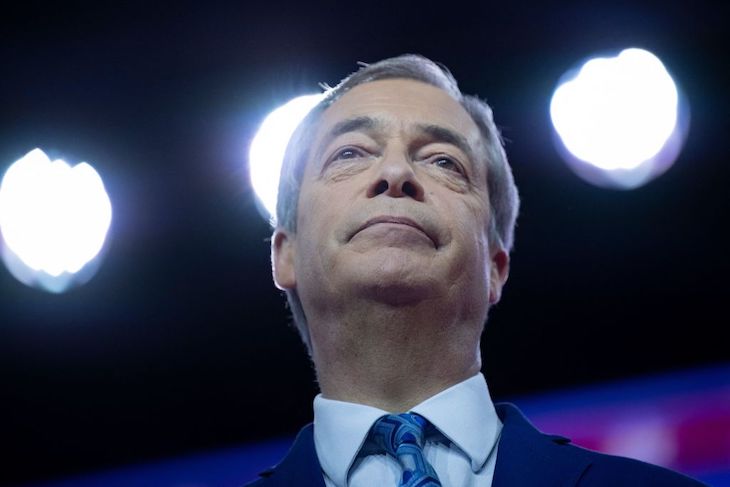The plot is thickening. If it turns out NatWest CEO Alison Rose was the source for BBC business editor Simon Jack’s scoop that private bank Coutts, part of the NatWest Group, rejected Nigel Farage as a customer not because of his political views but for a supposed lack of funds, then it’s hard to see how she will last in her job to the end of the week.
According to the Daily Telegraph, Rose sat next to Jack at a charity dinner the night before he published his story. At the time of writing, neither had responded to questions about what they’d discussed.
Certainly, the Coutts dossier that Farage has managed to obtain after submitting a legal request seems to make a mockery of Jack’s story. According to the minutes of a meeting of the Coutts Wealth Reputational Risk committee on November 17 last year, management was explicitly getting rid of Farage as a customer not because he’d done something illegal or wasn’t sufficiently wealthy, but rather because they deemed his ‘views’ unpalatable.
‘The committee did not think continuing to bank NF [Farage] was compatible with Coutts given his publicly-stated views that were at odds with our position as an inclusive organisation’, the minutes read. ‘This was not a political decision, but one centred around inclusivity and purpose’.
With Farage’s spectacular debunking of his debanking, the long-awaited backlash is now underway
It is objectively very funny, is it not, to exclude someone on the grounds of ‘inclusivity’. Equally funny is the claim that targeting Farage for his ‘views’ was ‘not a political decision’.
Speaking as someone who has written more than their fair share of corporate gobbledygook – as a speechwriter I’ve worked closely with numerous FTSE CEOs – I consider myself fully versed in the torturous language big western businesses now use while attempting bloodlessly to appear human. I’m all too familiar with the strange concept of statements of corporate ‘purpose’, by which virtually every large company now tries to sum up in a single sentence of whizzy-sounding but ultimately anodyne language how it is above the ugly business of merely making money and is instead more interested by far in some higher calling. These purpose statements are almost always underpinned by articulations of so-called corporate values, usually between three and five of them.
For what it’s worth, Coutts doesn’t actually seem to have a purpose statement, at least not one I could find easily on its website. Parent company NatWest certainly does, however. ‘We make money by lending money’, is not how it reads. Rather: ‘We champion potential, helping people, families and businesses to thrive’. Unless they are largely responsible for Brexit, presumably.
When I first became aware around 2016 of the then new mania for corporate purpose statements, I thought they must be either some sort of lavish cosmic joke or an eminently sensible response to what seemed at the time the very real prospect of Jeremy Corbyn becoming prime minister. In the days that followed his election, when the hordes inevitably came with their sticks for the fat cats, I reasoned, these purpose statements would be waved on the end of poles from office windows by multi-millionaire bosses. ‘We’re on your side really’, they would wail. ‘Don’t lynch us. Behold our purpose statement…with its vaguely worded commitment to social mobility’.
But purpose has persisted, long after the demise of Corbyn as a political force in the UK, or indeed of Bernie Sanders in the US. Purpose appears very much here to stay, and with it the sense that corporations and the people at the top of them are no longer content only to sell us stuff, but rather they want to have a meaningful say in what we value and how we lead our lives.
Our increasingly rapid capitulation to this desire, I believe, is a direct consequence of the decline of religion – Christianity, principally – as the guiding moral force within our society. A vacuum has been created that CEOs, drunk on professional success, abetted by rapacious Corporate Affairs teams, are only too happy to fill: first by pushing onto us, and then demanding we abide by, the values they have decided are important.
In this way, the moral codes that have long underpinned all human endeavour are being rapidly updated by retail and banking sages who by definition do not have our best interests at heart. How could they? They want our money.
The results are weird and getting weirder. Farage and the recent debanking phenomenon is the latest example, but others include the high-profile Bud Light advertising campaign featuring trans activist Dylan Mulvaney that has caused such uproar, and a similarly controversial advert for Gillette products that pushed the fashionable trope that masculinity is inherently toxic.
Anyone who works in a corporate environment will likewise be all too familiar with endless internal communications setting out the accepted way in which workers should navigate complex issues relating to LGBTQIA+ people, or the use of pronouns, or mental health, or the importance of respecting the rights of indigenous elders, or forms of privilege, or the patriarchy, or microaggressions, or the hierarchy of intersectional grievances from feminism to religion to body shape. The list goes on and on. It’s no longer anything like enough only to turn up and do your job well.
Brits are sick of being lectured by big business, but that by no means seem to stop corporations from doing it. Perhaps, with Farage’s spectacular debunking of his debanking, the long-awaited backlash is now underway.







Comments